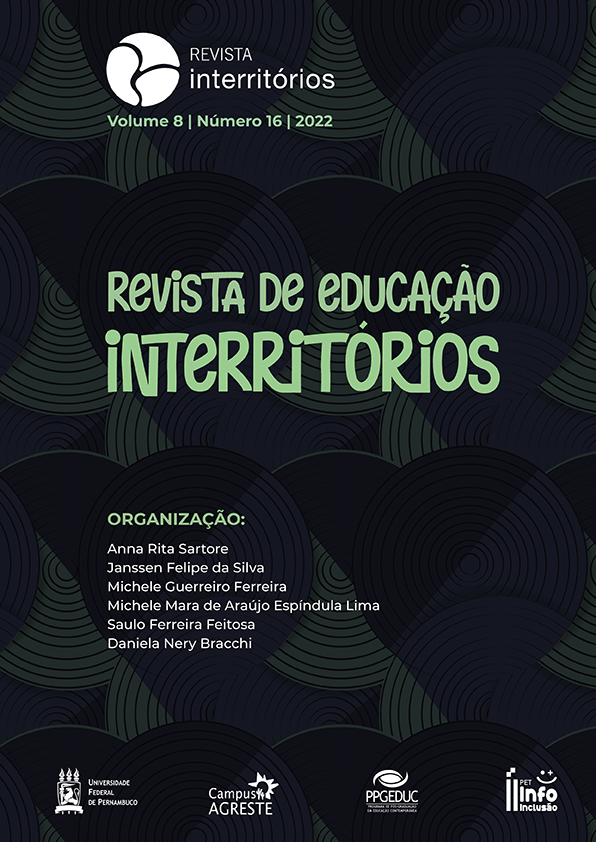Literacy and literacy in a intercultural perspective: an analysis of internship experiences
DOI:
https://doi.org/10.51359/2525-7668.2022.244158Keywords:
Literacy and Literacy, Elementary School Internship, InterculturalityAbstract
This article aims to present as intercultural students of literacy and literacy byBrazilian and African students of the Pedagogy course of the University ofInternational Integration of Afro-Brazilian Lusophony (UNILAB-CE) in the courseof the Internship discipline in the Early Years of Elementary School, held at amunicipal public school in the municipality of Redenção-CE. Through theinternship activities, a school reinforcement project was developed withstudents from the second and third year of elementary school with a degree ofdisabling in the mastery process and appropriation of reading and written code.Based on a diagnostic assessment of the writing hypotheses, a sequence ofactivities was carried out that comprises an intercultural learning proposal,closely linked to a social, cultural, educational, political, political, ethical andepistemic project towards the decolonization and transformation of socialexclusion processes that these students go through systematically charged bythe Permanent Evaluation System for Basic Education in Ceará (SPAECE). Asexperienced in the context of this pedagogical discipline, it is possible to presentinternship students, through reading and writing practices, new epistemicapproaches that establish relations between Brazil and Africa, central to thereconstruction of thoughts, walkers towards a decolonial, anti-racist andintercultural.
References
FERREIRO, E.;TEBEROSKY, A. Psicogênese da língua escrita. Porto Alegre: Artes Médicas Sul, 1999.
FERREIRO, E. Reflexões sobre alfabetização. São Paulo: Cortez, 2011.
GOMES, Nilma Lino. Movimento Negro Educador. Saberes construídos nas lutas por emancipação. Rio de Janeiro, Editora vozes, 2017.
MORTATTI, Maria do Rosário Longo. Alfabetização no Brasil: conjecturas sobre as relações entre políticas públicas e seus sujeitos privados. Revista Brasileira de Educação v. 15 n. 44 maio/ago. 2010
NOGUEIRA, Renato. Infancialização, ubuntu e teko porã: elementos gerais para educação e ética afroperspectivistas childhood & philosophy, Rio de Janeiro, v. 14, n. 31, set.-dez. pp. 625-644, 2018.
NOGUEIRA, Renato. Denegrindo a filosofia: O pensamento como coreografia
De conceitos afroperspectivistasGriot – Revista de Filosofia, Amargosa, Bahia, v.4, n.2, p.1-19,2011.
OLIVEIRA, Luiz Fernandes de, CANDAU, Vera Maria Ferrão. Pedagogia decolonial e educação antirracista e intercultural no Brasil. Educ. rev., vol.26, n.1, pp.15-40, 2010.
PIMENTA, Selma Garrido; LIMA, Maria Socorro Lucena. Estágio e Docência. São Paulo: Cortez, 2004
SOARES, Magda. Alfabetização e Letramento. São Paulo: Contexto, 2008.
SOARES, Magda. A reinvenção da alfabetização. Presença Pedagógica • v.9 n.52 • jul./ago. 2003
TEIXEIRA, Aline Moreira. Um olhar sobre a cidade de redenção: da história dos engenhos à invisibilidade da presença negra. 2016. [ Monografia (Graduação)] - Redenção, Curso de Bacharelado em Humanidades, Instituto de Humanidades e Letras-ihl, Universidade da Integração Internacional da Lusofonia Afro-brasileira, 2016. Disponível em> http://repositorio.unilab.edu.br:8080/jspui/handle/123456789/1511
Downloads
Published
Issue
Section
License
Copyright (c) 2022 Helem Diany Parente

This work is licensed under a Creative Commons Attribution 4.0 International License.
1. Proposta de Política para Periódicos de Acesso Livre
Autores que publicam nesta revista concordam com os seguintes termos:
- Autores mantém os direitos autorais e concedem à revista o direito de primeira publicação, com o trabalho simultaneamente licenciado sob a Licença CreativeCommons Atribuição 4.0
Internacional (texto da Licença:https://creativecommons.org/licenses/by/4.0/)que permite o compartilhamento do trabalho com reconhecimento da autoria e publicação inicial nesta revista. - Autores têm autorização para assumir contratos adicionais separadamente, para distribuição não-exclusiva da versão do trabalho publicada nesta revista (ex.: publicar em repositório institucional ou como capítulo de livro), com reconhecimento de autoria e publicação inicial nesta revista.
- Autores têm permissão e são estimulados a publicar e distribuir seu trabalho online (ex.: em repositórios institucionais ou na sua página pessoal) a qualquer ponto antes ou durante o processo editorial, já que isso pode gerar alterações produtivas, bem como aumentar o impacto e a citação do trabalho publicado (Veja O Efeito do Acesso Livre).


